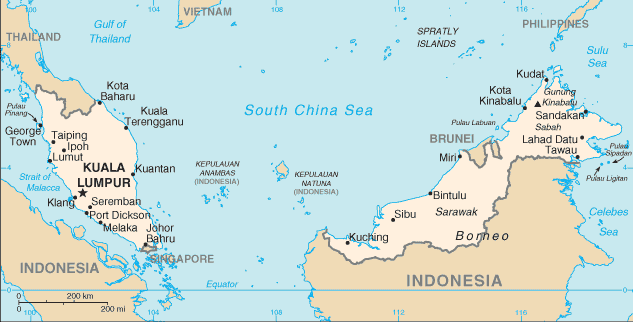Malaysia reports increase in melioidosis post-floods
Malaysia's third largest state, Pahang, has seen a surge in cases of melioidosis since the massive flooding that started in late December 2014.
According to a Sun Daily report, Pahang health officials say there are already 21 cases detected during the first 2 months of 2015, from 16 cases throughout 2014. The most cases in the state this year have been reported from Jerantut district, which accounts for a third of the cases.
Pahang Health director Dr Zainal Ariffin Omar advised the public to take the necessary precaution to avoid getting the disease, such as wearing water-proof gloves and shoes for those working in estates and plantations.

Malaysia/CIA
Melioidosis (also known as Whitmore disease and Nightcliff gardener's disease) is caused by the bacterium, Burkholderia pseudomallei. The disease though somewhat rare has been seen in areas of Southeast Asia and Northern Australia, particularly after heavy rains. In Thailand it is considered a disease of rice farmers.
The organism is saprophytically found in soil and water. People usually get infected by contact with contaminated soil or water through skin wounds, inhalation or rarely through ingestion of contaminated water.
Person to person transmission can occur through contact with blood and body fluids of an infected person.
Depending on how heavy the infection incubation can range from hours to weeks. Infection may show nosymptoms but it can quickly progress to disseminated disease involving skin and a variety of organs.
Pneumonia from B. pseudomallei can be seen either in acute or chronic disease. Chronic pulmonary meloidosis may present itself years after exposure and can mimic tuberculosis.
Fatality rates of melioidosis can reach up to 75 percent even with appropriate antibiotic treatment. Fatalities are particularly greater in those with underlying conditions like diabetes mellitus or renal disease.
Related: Malaysia dengue death toll up to 62
People at higher risk of contracting this disease are those with jobs or hobbies that increase their exposure to contaminated soil and water like military, construction, farmers, eco-tourists and other adventure travelers.
Prevention is based on avoiding exposure of cuts and other trauma with soil and water in endemic areas. This is especially important if the person has an underlying disease. The use of boots and gloves are recommended for people whose work involves contact with soil and water, like farmers.